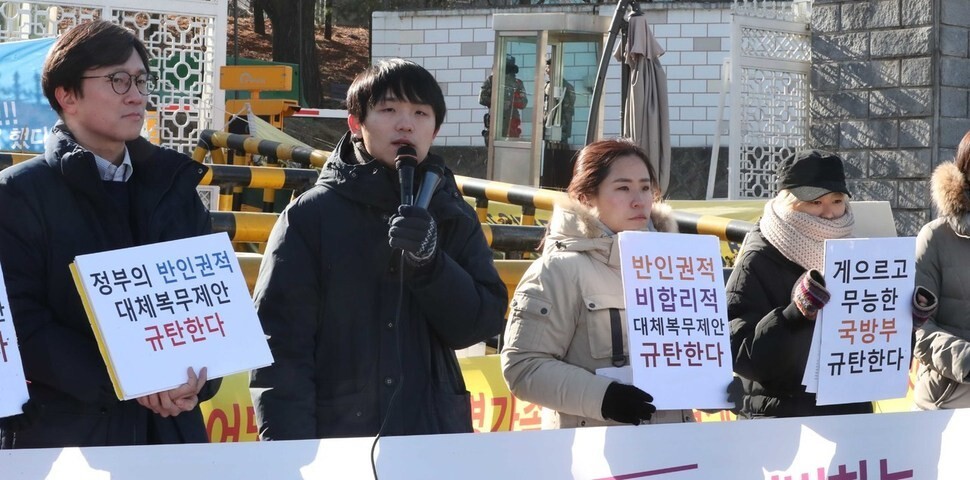hankyoreh
Links to other country sites 다른 나라 사이트 링크
Controversy swells over Defense Ministry’s terminology revision for “conscientious objectors”

Hong Jeong-hun, 29, an activist with a nonprofit organization, refused to enlist in the military purely for reasons of conscientiousness, and not because of religious belief. Last year, a district court sentenced Hong to one year and six months in prison. Hong is currently waiting for the verdict of his appeal.
Beginning with Buddhist and peace activist Oh Tae-yang in Dec. 2001, there have been about 80 South Koreans like Hong who have refused to perform their military service on the grounds of conscientiousness – including their commitment to peace and nonviolence – even without being adherents of some specific religion, such as the Jehovah’s Witnesses.
After South Korea’s Ministry of National Defense (MND) announced on Jan. 4 that it would be using the term “objection to military service based on religious convictions and other reasons” in lieu of “conscientious objection to military service,” critics have said that the government is being too sensitive to opponents’ false narrative that labeling objection to military service as “conscientious” implies that performing one’s military service is “not conscientious.” Members of the legal establishment argue that the Constitutional Court and the Supreme Court’s interpretation of “constitutional conscientiousness” based on Article 19 of the Constitution (“All citizens shall enjoy freedom of conscience”) differs from the MND’S interpretation of everyday “moral conscientiousness.”
When the Constitutional Court decided on June 28, 2018, that punishing conscientious objectors without offering them an alternative form of service was unconstitutional, it explained that this began with the “meaning of conscientiousness as protected by the constitution.” The Constitutional Court explicitly dealt with the MND’s attempt to dodge responsibility by changing terminology: “The term ‘conscientious objection to military service’ only refers to objection to military service resulting from or for reasons of the conscience, and it does not mean that refusing to perform military service is itself moral or legitimate.”
“The use of the term ‘conscientious objection to military service’ certainly does not mean that people who perform their military service are not conscientious,” the court made clear.
“Acknowledging conscientious objection implies respect for an individual’s conscience; it does not imply that other people are not conscientious,” said Lee Jong-soo, a professor at the Yonsei University College of Law, when asked on Jan. 7 about the MND’s change of terminology.
“The freedom of conscience refers to subjective convictions and judgments originating from an individual’s inner world,” said Noh Hui-beom, an attorney who previously served as a research assistant for the Constitutional Court. This is only a matter of “the fervent and specific cry of the heart” of a single individual, in the words of the Constitutional Court, and does not suddenly make other people immoral, Noh said.
There are also concerns that omitting the word “conscientious” could sow confusion about the purpose of the Constitutional Court and Supreme Court’s decision to allow “conscientious objection to military service” based on the “freedom of conscience” enshrined in Article 19 of the Constitution.
“The Defense Ministry’s terminology could provoke the misunderstanding that only religious beliefs are recognized as a legitimate reason for refusing to perform one’s military service,” said Lee Chang-hwa, an attorney.
But some think the Defense Ministry’s change of terminology doesn’t meant that much. “Though this could create some controversy, the Defense Ministry appears to have left open the door for other reasons for conscientious objection by using the expression ‘religious convictions and other reasons,’” said a source at the Constitutional Court.
By Choi Woo-ri and Ko Han-sol, staff reporters
Please direct comments or questions to [english@hani.co.kr]

Editorial・opinion
![[Column] Has Korea, too, crossed the Rubicon on China? [Column] Has Korea, too, crossed the Rubicon on China?](https://flexible.img.hani.co.kr/flexible/normal/500/300/imgdb/original/2024/0419/9317135153409185.jpg) [Column] Has Korea, too, crossed the Rubicon on China?
[Column] Has Korea, too, crossed the Rubicon on China?![[Correspondent’s column] In Japan’s alliance with US, echoes of its past alliances with UK [Correspondent’s column] In Japan’s alliance with US, echoes of its past alliances with UK](https://flexible.img.hani.co.kr/flexible/normal/500/300/imgdb/original/2024/0419/2317135166563519.jpg) [Correspondent’s column] In Japan’s alliance with US, echoes of its past alliances with UK
[Correspondent’s column] In Japan’s alliance with US, echoes of its past alliances with UK- [Editorial] Does Yoon think the Korean public is wrong?
- [Editorial] As it bolsters its alliance with US, Japan must be accountable for past
- [Guest essay] Amending the Constitution is Yoon’s key to leaving office in public’s good graces
- [Editorial] 10 years on, lessons of Sewol tragedy must never be forgotten
- [Column] A death blow to Korea’s prosecutor politics
- [Correspondent’s column] The US and the end of Japanese pacifism
- [Guest essay] How Korea turned its trainee doctors into monsters
- [Guest essay] As someone who helped forge Seoul-Moscow ties, their status today troubles me
Most viewed articles
- 1[Column] The clock is ticking for Korea’s first lady
- 2Samsung barricades office as unionized workers strike for better conditions
- 3[Correspondent’s column] In Japan’s alliance with US, echoes of its past alliances with UK
- 4After 2 months of delayed, denied medical care, Koreans worry worst may be yet to come
- 5[Column] Has Korea, too, crossed the Rubicon on China?
- 6Hong Se-hwa, voice for tolerance whose memoir of exile touched a chord, dies at 76
- 7US overtakes China as Korea’s top export market, prompting trade sanction jitters
- 8All eyes on Xiaomi after it pulls off EV that Apple couldn’t
- 9[Photo] Smile ambassador, you’re on camera
- 10[News analysis] After elections, prosecutorial reform will likely make legislative agenda